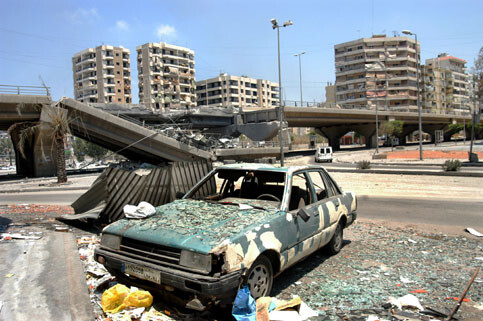IRIN 27 July 2006

A general view of a demolished area in the south of the Lebanese capital of Beirut, 24 July 2006. Israeli air strikes have destroyed much of the Lebanese infrastructure and transport network. (MaanImages/Payam Borazjani)
TYRE — Before they left in a convoy of cars filled with screaming children and fluttering white sheets, the women of Yaroun tried to organise a team to rescue the elderly and sick of their village that for two weeks has been caught up in the deadly crossfire of Hizbullah militants and the Israeli army just two kilometers from Lebanon’s southern border.
They failed. “All the men are migrant workers and most of the summer visitors are dual nationality Lebanese who were told to evacuate,” said Leila Saad. “So the only people left behind are women, children and the elderly. I saw a grandmother who was trapped in the rubble of her house, and we left her to die.”
Speaking from beside Tyre port as she awaited evacuation by a Canadian-chartered cruise liner to Cyprus, the dual nationality Lebanese-American mother of four described “a mad scene” as rockets struck the road close to her convoy as it made the perilous 50km drive north-west from Yaroun towards the relative safety of Tyre.
“We didn’t see Hizbullah or the Israelis, just aeroplanes, unexploded rockets and shrapnel,” she said.
Sitting under the shade of a palm tree outside the Tyre Rest House Hotel surrounded by empty bottles of water and fidgeting children, Maysam Ali, a Palestinian, said she escaped with her family of eleven after an Israeli shell destroyed the building next door to her in Abbassiye, 10km north east of Tyre.
“We left on 23 July and walked for an hour to Tyre where we slept in the bus stop and then the school. What worse can happen to us? We are hungry and we are homeless.”
Maysam Ali said her family had been fed by local people and by leaders of the Rashidiya Palestinian camp, just south of Tyre, where some food aid from Syria has arrived. She was due to take a bus on 26 July organised by the Bahia Hariri Foundation, a Lebanese development agency, to Sidon where she said she could stay with relatives in the Ein al-Helway Palestinian camp.
Abed Husseini, president of the Tyre municipality criticised the Lebanese government for its response to the humanitarian crisis in south Lebanon.
“It feels like there is a war against us from the outside and the inside. The Lebanese government has forgotten its own people here,” he said. “I have never seen a worse war than this. There has not been a single soldier among the dead. The Israelis are killing unarmed civilians. There are people who were buried alive in rubble in the villages near the border and their bodies are now being eaten by worms. Is this acceptable?”
Related Links
This item comes to you via IRIN, a UN humanitarian news and information service, but may not necessarily reflect the views of the United Nations or its agencies. All IRIN material may be reposted or reprinted free-of-charge; refer to the copyright page for conditions of use. IRIN is a project of the UN Office for the Coordination of Humanitarian Affairs.